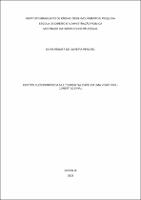Use este identificador para citar ou linkar para este item:
https://repositorio.idp.edu.br//handle/123456789/4308| Título: | Efeitos sucessórios da multiparentalidade em uma visão civil-constitucional |
| Autor(es): | Penchel, Sílvia Renata de Oliveira |
| Orientador(es): | Galvão, Laila Maia |
| Palavras-chave: | Multiparentalidade;Efeitos sucessórios;Partilha;Herança |
| Data de submissão: | 2023 |
| Editor: | Instituto Brasileiro de Ensino, Desenvolvimento e Pesquisa |
| Citação: | PENCHEL, Sílvia Renata de Oliveira. Efeitos sucessórios da multiparentalidade em uma visão civil-constitucional. 2023. 119 f. Dissertação (Mestrado em Direito) — Instituto de Ensino, Desenvolvimento e Pesquisa, Brasília, 2023. |
| Resumo: | O presente trabalho trata dos efeitos sucessórios da multiparentalidade, mais especificamente sobre a partilha entre os irmãos do “de cujus”, quando este não deixar descendentes, ascendentes ou cônjuge/companheiro. Pela lei atual o irmão bilateral herda mais que o unilateral, não havendo previsão para a figura do irmão trilateral, o qual poderá surgir em razão da multiparentalidade. O reconhecimento da multiparentalidade está crescendo de forma significativa, principalmente após o provimento 63 do CNJ, o qual permitiu que esse reconhecimento se dê diretamente na serventia de registro civil de pessoas naturais. É certo que em breve o direito sucessório deverá ser aplicado a tais casos, todavia não foi pensado para essas novas possibilidades. Assim, diante da lacuna legislativa, verifica-se a importância da presente pesquisa para a solução desses casos, sendo uma primeira hipótese o cabimento de maior quinhão ao irmão trilateral em razão do triplo vínculo. Ao final,testada a primeira hipótese,à luz de princípios de direito civil e constitucional, em especial o da dignidade da pessoa humana, verificou-se que tal solução não seria a melhor possível para o caso em questão, chegando-se à conclusão de que o irmão trilateral, na verdade, deve herdar uma quota menor que a dos irmãos bilaterais e unilaterais, na medida em que possui mais parentes, o que lhe garante um maior amparo econômico. |
| Abstract: | The present work deals with the succession effects of multiparenthood, more specifically about the sharing between the siblings of the “de cujus”, when he does not leave descendants, ascendants or spouse/partner. According to the current law, the bilateral sibling inherits more than the unilateral sibling, with no provision for the figure of the trilateral sibling, which may arise due to multiparentality. The recognition of multiparenthood is growing significantly, especially after provision 63 of the CNJ, which allowed this recognition to take place directly in the civil registry service of natural persons. It is true that inheritance law will soon be applied to such cases, however it was not designed for these new possibilities. Thus, in view of the legislative gap, the importance of this research for the solution of these cases is verified, with a first hypothesis being the appropriateness of a greater share to the trilateral brother due to the triple bond. In the end, after testing the first hypothesis, in the light of principles of civil and constitutional law, in particular that of human dignity, it was found that such a solution would not be the best possible solution for the case in question, reaching the conclusion that that the trilateral brother, in fact, should inherit a smaller share than that of the bilateral and unilateral brothers, insofar as he has more relatives, which guarantees him greater economic support. |
| URI: | https://repositorio.idp.edu.br//handle/123456789/4308 |
| Aparece nas coleções: | Mestrado Acadêmico em Direito Constitucional |
Arquivos associados a este item:
| Arquivo | Descrição | Tamanho | Formato | |
|---|---|---|---|---|
| DISSERTACAO_SÍLVIA RENATA DE OLIVEIRA PENCHEL_MESTRADO DIR_2023.pdf | 698.47 kB | Adobe PDF |  Visualizar/Abrir |
Os itens no repositório estão protegidos por copyright, com todos os direitos reservados, salvo quando é indicado o contrário.
